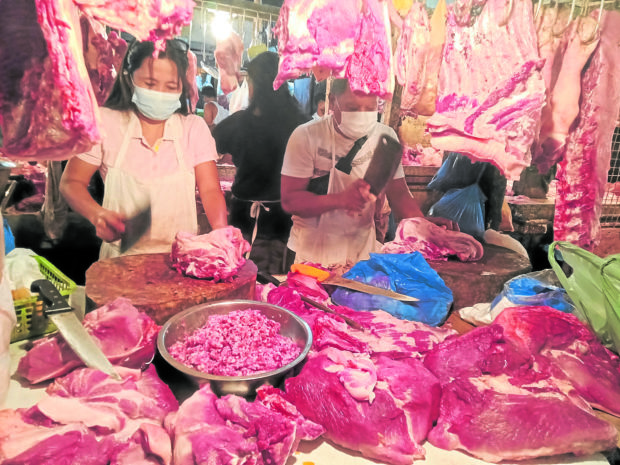Ilocos Norte cracks down on smuggled pork sold online

SOARING PRICE The price of pork has soared to P400 per kilo in Bulacan province due to scarcity of supply after 60 percent of the province’s hog population was hit by the African swine fever. —CARMELA REYES-ESTROPE
LAOAG CITY—Authorities in Ilocos Norte province warned the public against patronizing smuggled pork being sold online, as it threatened the local swine industry that has remained free of the African swine fever (ASF).
Dr. Loida Valenzuela, Ilocos Norte provincial veterinarian, said they started monitoring online sellers who advertised and collected orders on social media before placing bulk orders from their suppliers in Metro Manila.
The pork and other meat products were then transported to the province through private vehicles that have no proper freezing equipment for long-distance shipping. These products also entered the province without any indication of where they came from.
Aside from threatening the province’s ASF-free status, the smuggled meat could also bring in bacteria like salmonella, which could cause food-related illnesses if sold and consumed, Valenzuela said.
She said her office had already confiscated some 215 packs of bacon-strip cut of pork from an alleged online seller. Most of these orders, which were placed by some local restaurants, did not go through a proper inspection at the Ilocos Norte border.
Article continues after this advertisementValenzuela warned that Ilocos Norte’s “bagnet” (deep fried pork belly) and “longganisa” (meat sausages) industries would be affected if the smuggling of meat would continue.
Article continues after this advertisement“ASF can wipe out the entire hog industry. It can easily spread and has a high mortality rate among our affected animals,” she said.
The province has about 2,000 backyard and commercial hog raisers based on last year’s data from the provincial veterinary office.
Losses
In Pampanga province, about 70 hog raisers belonging to the Pampanga Swine Producers Association have each lost about P50 million due to the ASF outbreak in October 2019, according to their president, Toto Gonzales.
More than 1,000 hog farm workers have lost jobs then, he added.
Gonzales has urged the Department of Agriculture to provide a minimum of P20 million to each of the members to help them repopulate their farms.
“We understand that the government has prioritized responses to COVID-19. But the lack of pork stocks may affect the people’s nutrition,” Gonzales said in a phone interview on Monday. In Bulacan province, the price of pork has doubled to P400 per kilo as 60 percent of the province’s hog population has been hit by ASF. Bulacan has over 1,000 backyard and commercial hog farms.
Marilou Taway Cruz, secretary of the Malolos Pork Vendor Association, said the price of pork started to shoot up weeks before the Christmas holiday last year due to the scarcity.
Dr. Voltaire Basinang, Bulacan provincial veterinarian, said many local hog raisers had stopped operating for fear of another ASF outbreak. —REPORTS FROM JOHN MICHAEL MUGAS, TONETTE OREJAS AND CARMELA REEYES-ESTROPE INQ